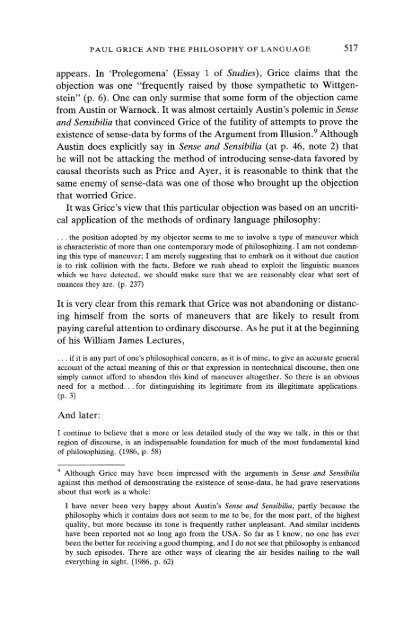Paul Grice and the philosophy of language
Paul Grice and the philosophy of language
Paul Grice and the philosophy of language
Create successful ePaper yourself
Turn your PDF publications into a flip-book with our unique Google optimized e-Paper software.
PAUL GRICE AND THE PHILOSOPHY OF LANGUAGE 517<br />
appears. In 'Prolegomena' (Essay 1 <strong>of</strong> Studies), <strong>Grice</strong> claims that <strong>the</strong><br />
objection was one "frequently raised by those sympa<strong>the</strong>tic to Wittgenstein"<br />
(p. 6). One can only surmise that some form <strong>of</strong> <strong>the</strong> objection came<br />
from Austin or Warnock. It was almost certainly Austin's polemic in Sense<br />
<strong>and</strong> Sensibilia that convinced <strong>Grice</strong> <strong>of</strong> <strong>the</strong> futility <strong>of</strong> attempts to prove <strong>the</strong><br />
existence <strong>of</strong> sense-data by forms <strong>of</strong> <strong>the</strong> Argument from Illusion. 9 Although<br />
Austin does explicitly say in Sense <strong>and</strong> Sensibilia (at p. 46, note 2) that<br />
he will not be attacking <strong>the</strong> method <strong>of</strong> introducing sense-data favored by<br />
causal <strong>the</strong>orists such as Price <strong>and</strong> Ayer, it is reasonable to think that <strong>the</strong><br />
same enemy <strong>of</strong> sense-data was one <strong>of</strong> those who brought up <strong>the</strong> objection<br />
that worried <strong>Grice</strong>.<br />
It was <strong>Grice</strong>'s view that this particular objection was based on an uncritical<br />
application <strong>of</strong> <strong>the</strong> methods <strong>of</strong> ordinary <strong>language</strong> <strong>philosophy</strong>:<br />
•.. <strong>the</strong> position adopted by my objector seems to me to involve a type <strong>of</strong> maneuver which<br />
is characteristic <strong>of</strong> more than one contemporary mode <strong>of</strong> philosophizing• I am not condemning<br />
this type <strong>of</strong> maneuver; I am merely suggesting that to embark on it without due caution<br />
is to risk collision with <strong>the</strong> facts. Before we rush ahead to exploit <strong>the</strong> linguistic nuances<br />
which we have detected, we should make sure that we are reasonably clear what sort <strong>of</strong><br />
nuances <strong>the</strong>y are. (p. 237)<br />
It is very clear from this remark that <strong>Grice</strong> was not ab<strong>and</strong>oning or distancing<br />
himself from <strong>the</strong> sorts <strong>of</strong> maneuvers that are likely to result from<br />
paying careful attention to ordinary discourse. As he put it at <strong>the</strong> beginning<br />
<strong>of</strong> his William James Lectures,<br />
•.. if it is any part <strong>of</strong> one's philosophical concern, as it is <strong>of</strong> mine, to give an accurate general<br />
account <strong>of</strong> <strong>the</strong> actual meaning <strong>of</strong> this or that expression in nontechnical discourse, <strong>the</strong>n one<br />
simply cannot afford to ab<strong>and</strong>on this kind <strong>of</strong> maneuver altoge<strong>the</strong>r. So <strong>the</strong>re is an obvious<br />
need for a method.., for distinguishing its legitimate from its illegitimate applications.<br />
(p. 3)<br />
And later:<br />
I continue to believe that a more or tess detailed study <strong>of</strong> <strong>the</strong> way we talk, in this or that<br />
region <strong>of</strong> discourse, is an indispensable foundation for much <strong>of</strong> <strong>the</strong> most fundamental kind<br />
<strong>of</strong> philosophizing. (1986, p. 58)<br />
9 Although <strong>Grice</strong> may have been impressed with <strong>the</strong> arguments in Sense <strong>and</strong> Sensibilia<br />
against this method <strong>of</strong> demonstrating <strong>the</strong> existence <strong>of</strong> sense-data, he had grave reservations<br />
about that work as a whole:<br />
I have never been very happy about Austin's Sense <strong>and</strong> Sensibilia, partly because <strong>the</strong><br />
<strong>philosophy</strong> which it contains does not seem to me to be, for <strong>the</strong> most part, <strong>of</strong> <strong>the</strong> highest<br />
quality, but more because its tone is frequently ra<strong>the</strong>r unpleasant. And similar incidents<br />
have been reported not so long ago from <strong>the</strong> USA. So far as I know, no one has ever<br />
been <strong>the</strong> better for receiving a good thumping, <strong>and</strong> I do not see that <strong>philosophy</strong> is enhanced<br />
by such episodes. There are o<strong>the</strong>r ways <strong>of</strong> clearing <strong>the</strong> air besides nailing to <strong>the</strong> wall<br />
everything in sight. (1986, p. 62)














